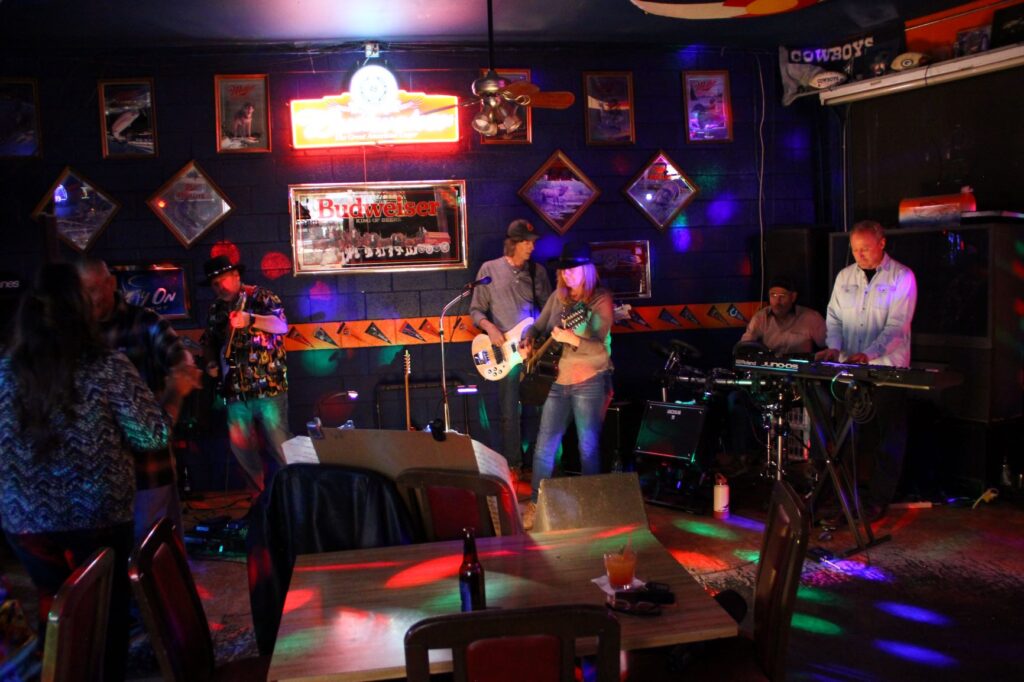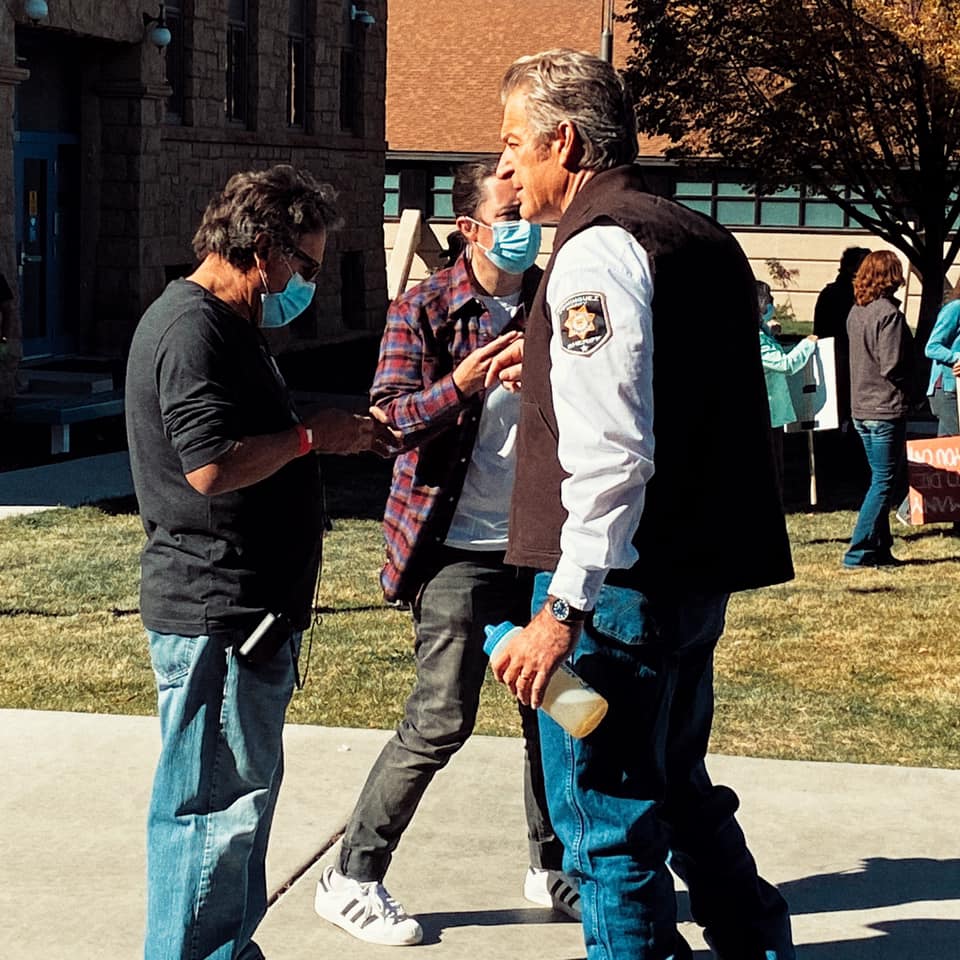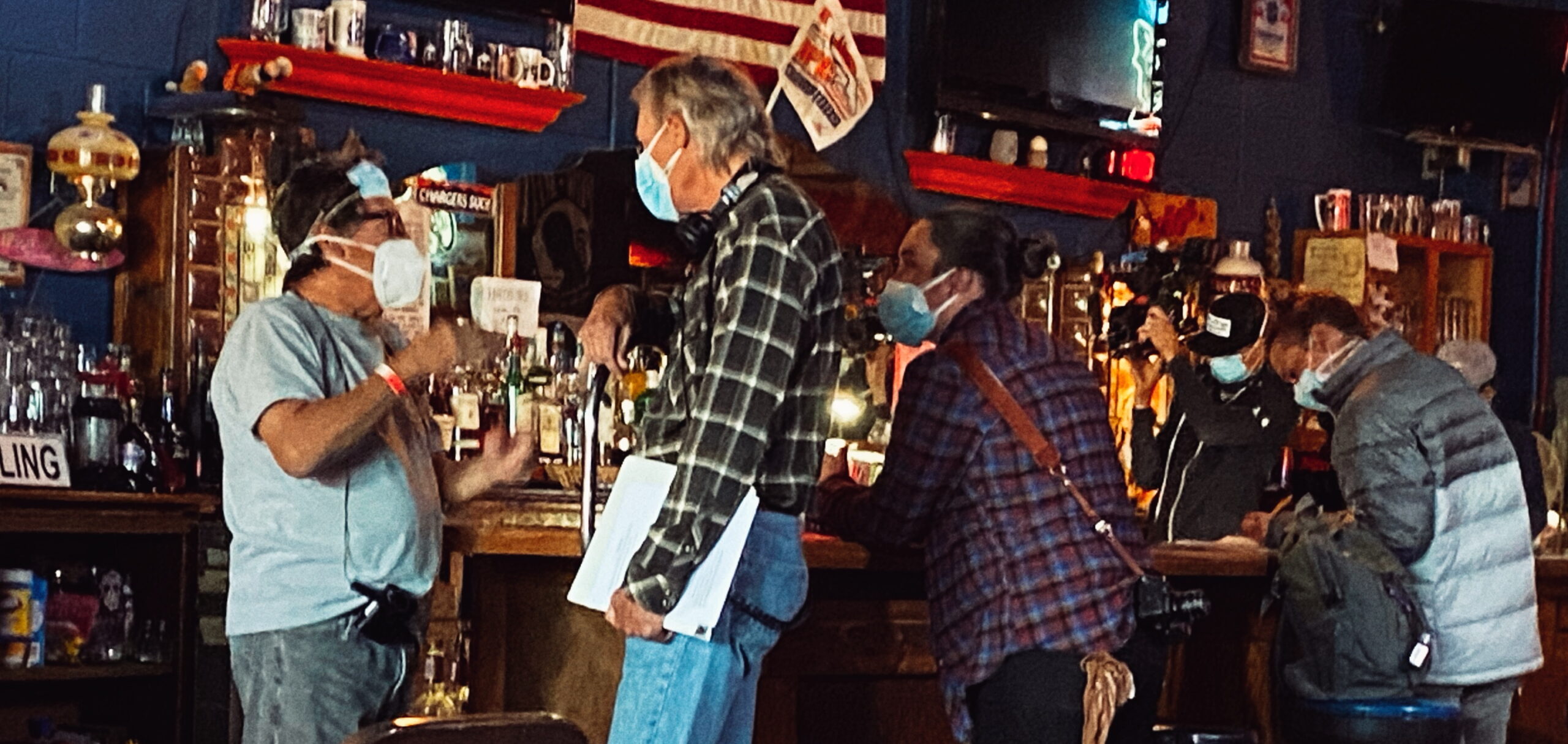I have a walkie-talkie by the gearshift in my VW Passat.
I hear the command: “Roll sound.”
And the reply: “Rolling sound.”
More whispering—all the directions are being given inside the café a half-block away, where the scene is being filmed.
“Roll Camera” in a quiet whisper.
Wait, wait …
An assistant director stands outside my car to make sure I don’t jump the gun.
And over the walkie-talkie:
“Action, Mark!”
That’s my cue.
My high-stakes role is to drive past the café at a steady 10 m.p.h.!

My car’s motion starts the chain of events inside the café, although my vehicle is nothing other than background filler / background fodder for whatever is happening inside (I’m assuming there were a few lines of dialogue or something).
As soon as I have passed the café, a small army of “protestors” takes to the street carrying signs and chanting behind a blue pick-up truck with an activist standing in the bed with a megaphone.
“What do we want?”
“Justice!”
Etcetera.
You get the idea.
We shoot the scene five times. Maybe someone inside the café muffed their lines? Or their inflection wasn’t right? Or maybe the light wasn’t correct?
(I know my driving is perfect because nobody tells me to change a thing.)
I notice on the re-takes that the “protestors” moved from the far side of the street to the middle of the street. Obviously, lots of tweaks and variables on a film production set.
After each take, I back up the Passat and wait.
“Action, Mark!”

A week later, my band Flashback also films a scene inside a “honky-tonk” bar. It’s a critical scene where an off-duty cop grabs an empty bottle of Budweiser off a pool table to gather DNA that will link a killer to a crime. I think.
Again—the production involves an army. Director, assistant directors, lighting people, grips, gaffers, camera operators, producers, makeup, prop guy, wardrobe. And, of course, my five-piece band and sound guy, too. And don’t forget the extras who pretended to drink beer (it’s water in the bottles) and extras who danced, too. The extras had their own director who showed them what to do—how and where to move.
This was a major-budget deal and the guy directing it all was Felix Alcala, who has such notable credits to his work as “Breaking Bad,” “The Good Wife,” and “Madam Secretary.”
All this movie-making effort took place in Mancos and Cortez.The script is for a show called BADWATER, written by my fiction-writing friend Chuck Greaves. Chuck was also on the set every single day, helping make decisions with Felix and tweaking various elements of how the story was coming together. The crew worked 10-hour days for more than two weeks, including a two-day break when a crew member tested positive for COVID-19 (it turned out to be a false positive). All this work will become a one-hour or so pilot for BADWATER and the hope is that Netflix or some service greenlights the production of a full season of the show.

Pretty cool!
Kudos to Chuck for pulling this off. The actors and crew were all top-flight talent. There is a ton of money at risk to put this story in a riveting format for TV. I have no doubt the final result will be a knockout.
But as I drove the car and as I played the song in the honky-tonk bar, I couldn’t help but think how we writers have it easy.
We are lighting, makeup, sound, and action.
We are dialogue.
We are the prop guy.
We are the camera operator who gets to zoom in tight or stay back, who gets to follow someone for an extended period.
We are the band (if we need one).
We choose emphasis or inflection in a conversation.
It’s our decision whether to back up and start over—and take another run at a scene.
We have all this power—no assistant writers, nobody looking over our shoulder to tell us our main protagonist needs more light on her face or if we want to hear that bottle of beer slam down on the pool table with a bit more authority.
It’s our call.
Pen to paper (or keyboard on a computer). It’s all so straightforward.
Yeah, I know it’s hard work, too.
But it’s all up to us.


Thank you, Mark and Flashback, for helping us out. And you make an excellent point about the autonomy, and the omniscience, of the novelist. Television requires that we surrender a little of that for the greater good, and that we trust our colleagues to rise to the occasion which, in this case, they clearly did.
Looked like a fabulous team from my perspective, that’s for sure.
Love it. And I hope it makes it to the TV – so I can point at you and say “Hey, I know that guy!”
Don’t blink, whatever you do.
What fascinating experiences! Fun to hear the back curtain info! Yes. We don’t have to tell them how to do it, just what to do. We are lucky in that way…. but most successful screenwriters tell me that we are still practically the lowest man on the totem pole and often not even asked to be on scene! Maybe that is changing. Screenwriting and movie making seems to always be in a state of change. Makes it interesting too, I suppose.
Heard the same thing, Karen. But I think that particular totem pole pays pretty well, as long as you latch onto a good network. Thank you !
Fun description of your experience, Mark! Like Terri, I’ll be waiting for you to announce when it airs!!!
Thanks Janet !
Sounds like a fun peek behind the scenes, and an interesting conclusion. I have a friend who composes orchestral scores. She doesn’t even get to hear her music until someone agrees to hire all the musicians.
Dani — THAT has got to be frustrating. It’s a big group effort. I found out later the director (in this case) doesn’t even sit in on the editing …. he might comment after it’s been edited, but that’s about all.
This is a wonderful read and take on filming this project! One, I do not often get to hear about, see, or read about as a Makeup Artist. I absolutely loved it and appreciate your taking the time to write about your personal experience first hand!
Thank you, Cory !